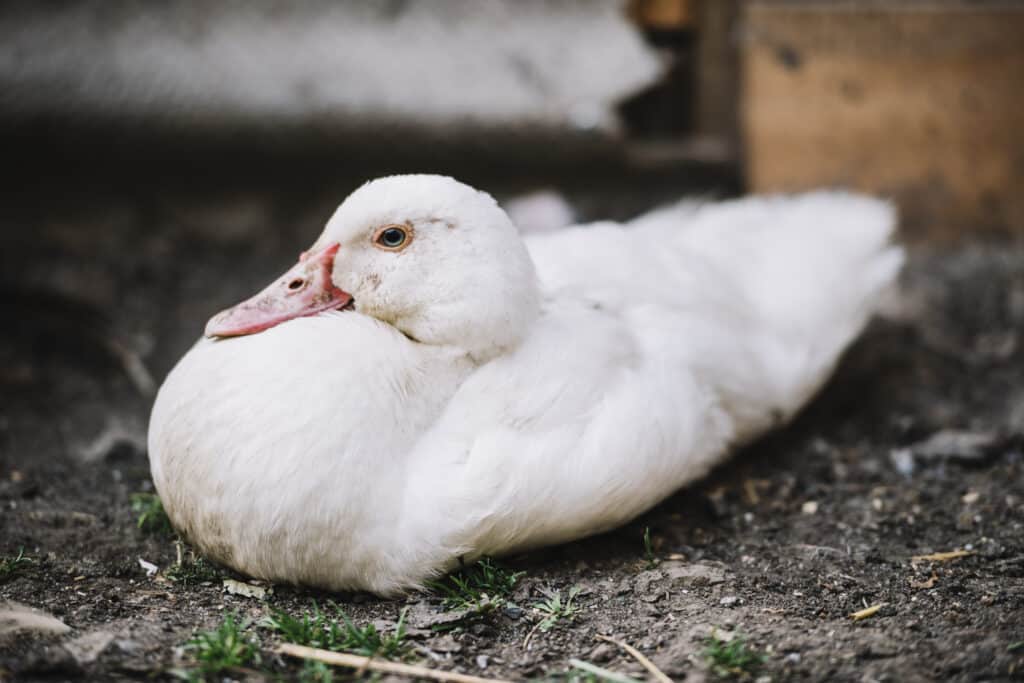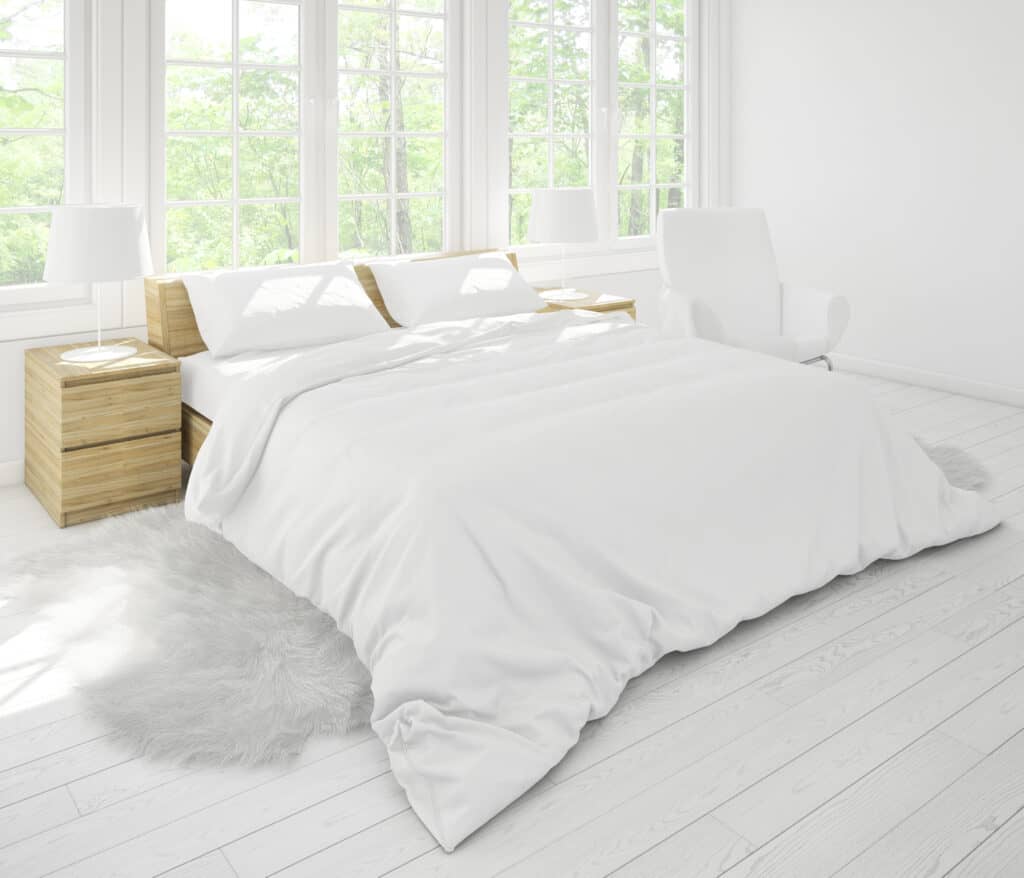- You are here:
- Home »
- Organic Bedding »
- Down vs. Down Alternative: Which is Better for You?
Down vs. Down Alternative: Which is Better for You?
Disclaimer: As an Amazon Associate I earn from qualifying purchases.
When you are shopping for a new comforter, you will likely be faced with the choice of down vs down alternative. So, which is better for you? Down is made from real feathers and down alternative is made from synthetic materials. Both have their pros and cons, so let’s take a closer look at them.
What Is Down?
Down is the soft, fluffy layer of feathers that is found under the tougher outer feathers of ducks and geese. It is what gives down comforters their warmth and loft. Down is graded by its fill power, which is a measure of how much space it takes up.
The higher the fill power, the warmer and fluffier the down will be. A good down comforter should have between 550 and 750 fill power.
Down is sourced by gathering feathers from ducks and geese slaughtered for meat, but some down producers still life-pluck live birds. To make sure your down comforter or pillow has been ethically sourced, look for the Responsible Down Standard and Global Traceable Down Standard certification label.

What Is Down Alternative?
Down alternative is made from synthetic materials that mimic the warmth and loft of down. It is a good choice for people who are allergic to down or who want a vegan comforter. Down alternative comforters are also less expensive than down comforters.
The Pros and Cons of Down
Natural down has been used for centuries in duvets and pillows because it is an excellent insulator. In this section, we’ll look at the benefits and drawbacks of using natural down in your bedding.
Pros
- Down comforters are natural, soft, and lofty. It’s these qualities that make down so cozy and comfortable.
- Down is a great insulator. It traps heat in the winter and keeps you cool in the summer.
- Down is breathable. This means it will regulate your body temperature and keep you from getting too hot or sweaty at night.
- Down is lightweight, making it ideal for people who are sensitive to heavy bedding.
- If you buy a down comforter with an organic cotton casing, you can be sure it’s completely biodegradable and won’t contribute to landfill waste.
Cons
- Down is more expensive than synthetic fill because it is a natural product.
- Down comforters need to be dry cleaned, which can be costly.
- Some people are allergic to down. If you’re allergic to feathers, you may want to avoid down bedding altogether.
- Down can be difficult to care for as it needs to be fluffed regularly to maintain its shape and always use a duvet cover to protect it from dirt and dust.
- It may involve animal cruelty as birds may be live-plucked for their down.
The Pros and Cons of Down Alternative
Down alternative is a relatively new product that has only been on the market for a few decades. In this section, we’ll look at the benefits and drawbacks of using down alternative in your bedding.
Pros
- It’s cheaper than natural down.
- Down alternative comforters can be machine washed, which is more convenient than dry cleaning.
- Down alternative is hypoallergenic, so it’s a good choice for people with allergies.
- It´s a great option for vegans and people who don’t want to use products that may involve animal cruelty.
Cons
- It’s not as warm as natural down because it is not as good of an insulator.
- Down alternative comforters can be heavier than natural down comforters.
- Some people find down alternative to be less comfortable than natural down because it is not as soft.
- Some down alternative comforters can be noisy and crinkly, so if you like to sleep in silence, this may not be the best option for you.
- Down alternative comforters can lose their shape over time and may need to be replaced more often than natural down comforters. Some low-quality down alternative comforters may start clumping after a few washes.
- It’s not eco-friendly because it´s usually made from polyester, which is a petroleum-based product and it´s not biodegradable, which means it will stay in landfills for centuries.

Which Is Better for You?
Down comes from the soft, insulating undercoat that sits beneath the feathers. The undercoat is composed of two types of fibers: long guard hairs and short downy fibers. Down comforters are usually made from a mixture of both fibers, giving them their unique properties.
Guard hairs repel water and dirt, while downy fibers trap heat, making them an ideal choice for bedding. However, not all down is created equal. The best down comforters are made from 100% certified Responsible Down Standard (RDS) down, which comes from ducks and geese that have been humanely raised and treated.
RDS certification ensures that the birds have not been force-fed or live-plucked and requires access to adequate food, water, and shelter. So, if you’re looking for a cozy, natural bedding option that will keep you warm all winter long, look for a down comforter with cotton casing and RDS certification.
When it comes to comforters, you generally get what you pay for. Down alternative comforters are usually cheaper than natural down comforters, but they don’t perform as well.
Down alternative comforters are not as warm as natural down comforters and can be heavier. Additionally, some people find down alternative to be less comfortable than natural down because it is not as soft.
Finally, down alternative comforters can lose their shape over time and may need to be replaced more often than natural down comforters. So, if you’re looking for the best-performing and longest-lasting comforter, natural down is the way to go. But if you’re on a budget or allergic to down, down alternative may be a decent compromise.
Read More: Down vs Wool Comforters
How to choose the right comforter?
Choosing the right comforter can be tricky. Consider the following factors when shopping for a comforter:
- Climate is an important factor to consider when choosing a comforter. If you live in a warm climate, you’ll want a lighter comforter. Conversely, if you live in a cold climate, you’ll want a heavier comforter.
- The filling is another important factor to consider when shopping for a comforter. Down is a popular choice, but down alternative is also available. Apart from that, there are wool comforters, cotton comforters, and eucalyptus comforters and all these options come with their own set of pros and cons.
- The weight of the comforter is also an important factor to consider. Heavier comforters are great for cold climates, but they can be too hot for warm climates. Lighter comforters are more versatile, but they may not provide enough warmth in a cold climate.
- Finally, consider the size of the comforter. You’ll want to choose a size that’s appropriate for your bed. If you have a twin-size bed, you’ll need a twin-size comforter. If you have a queen-size bed, you’ll need a queen-size comforter, and so on.
FAQs
Is down alternative warmer than down?
There is no definitive answer to this question since it depends on the amount of specific materials used in the down alternative product. However, in general, down alternative is not as warm as down.
Is down alternative cheaper than down?
Down alternative is usually cheaper than down, although there are some premium down alternative products that are more expensive.
Is down alternative hypoallergenic?
Down alternatives are generally better for people who suffer from allergies as they don’t trap dust and pollen like natural down can. However, there are some people who are allergic to the materials used in down alternative products, so it’s always best to check the labels before purchasing, especially if you suffer from chemical sensitivities.
Is down alternative easy to care for?
Down alternative is usually easier to care for than down, as it is often machine washable. However, there are some down alternative products that require special care, so it’s always best to check the labels before purchasing.
What types of comforters are used in hotels?
Hotels usually use down alternative comforters as they are cheaper and easier to care for. However, there are some hotels that use down comforters, so it really depends on the hotel.
Is down softer than down alternative?
Down is usually softer than down alternative, but there are some premium down alternative products that are just as soft.
Read More: What Are the Best Eucalyptus Comforters?
Bottom Line
Which is better for you really depends on your needs. If you’re looking for the best-performing and longest-lasting comforter, natural down is the way to go. But if you’re on a budget or allergic to down, down alternative may be a decent compromise. Choosing the right comforter can be tricky, so consider the following factors: climate, filling, weight, and size.
And don’t forget to fluff your comforter regularly! Do you have any questions about down or down alternative comforters? Leave a comment below and we’ll do our best to answer them. Happy shopping!
Read More: Best Natural Duvet Insert Types
About the Author Kamila Flieger
My name is Kamila, and I'm passionate about researching non-toxic, organic products for the home. I believe it's so important to create a safe and healthy environment for our families, and I enjoy helping others do the same.

